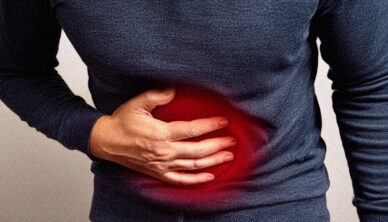Contents
Ulcerative Colitis

Ulcerative colitis is a long-term condition where the colon and rectum become inflamed. Ulcerative colitis is thought to affect around 1 in 420 people in the UK, although it is becoming more common over time.
What is Ulcerative Colitis
Ulcerative Colitis is a form of Inflammatory Bowel Disease (IBD) that affects the colon and rectum, leading to ongoing inflammation, ulcers, and discomfort. Without proper treatment, it can impact daily life and overall well-being.
Potential Causes
While the exact cause is unknown, key contributing factors include:
- Immune System Dysfunction – The body’s immune system mistakenly attacks the healthy cell sin the digestive tract.
- Genetics – A family history of IBD increases the likelihood of developing the condition.
- Environmental Factors – Diet, lifestyle and gut bacteria imbalances may contribute.
- Stress & Gut Health – Chronic stress and disruptions in gut microbiota could trigger symptoms.
Signs & Symptoms
The common symptoms of Ulcerative Colitis are:
- Recurring diarrhoea – often with blood or mucus
- Severe abdominal cramps & pain
- Fatigue & unexplained weight loss
- Urgent need to pass stools
- Joint pain, eye irritation or skin issues
Diagnosis Tests for Ulcerative Colitis
To diagnose ulcerative colitis, your GP will first ask about your symptoms, general health and medical history.
- Blood Tests & Stool Tests – To check for inflammation and infections
- Colonoscopy & Biopsy – The most reliable test for UC
- Imaging Tests – CT or MRI scans for a deeper assessment
Treatment Options
- Medication Therapy
Aminosalicylates (5-ASA drugs) – First-line treatment to reduce inflammation
Corticosteroids – For moderate-to-severe flare-ups
Immunosuppressants – To prevent immune system overreaction
Biologic & Targeted Therapies – Advanced treatments for severe cases
- Dietary & Lifestyle Changes
Low-fibre or low-residue diet during flare-ups to ease symptoms
Probiotics & anti-inflammatory foods to support gut health
Avoiding trigger foods (spicy foods, caffeine, alcohol)
- Surgery for Ulcerative Colitis
Colectomy (removal of colon) – For severe cases that don’t respond to medication
J-pouch surgery – Creates a new pathway for stool elimination
Minimally invasive procedures for symptom relief
Monitoring and Follow-Up
Long-term management is essential, involving regular check-ups to assess symptoms, treatment efficacy, and potential complications. Monitoring may include:
Arranging To Visit A Private GP
To discuss any worrying symptoms that might be an indication of Ulcerative Colitis, then you can make an appointment with one of our private GPs. Appointments are available to everyone and can often be booked for the same day. There is no need to be registered with our Buckinghamshire hospital, or live locally.
If you have insurance which covers a GP visit, we can in most cases invoice the insurer directly. Where you are paying directly, the cost for a 30 minute consultation is £100.
Any additional costs will always be discussed. They could apply if you are referred for an MRI scan, or to a consultant, or for other agreed decisions to support your health.
18 March 2025
